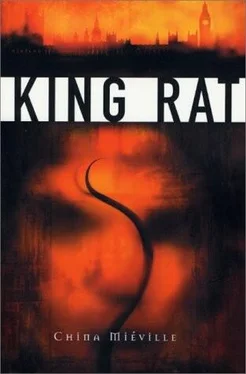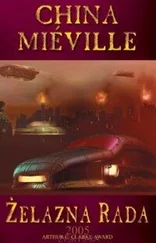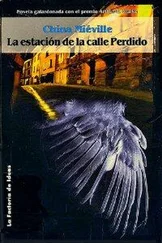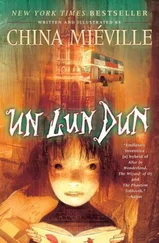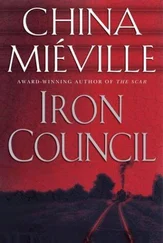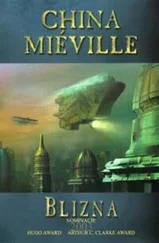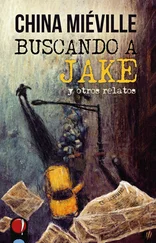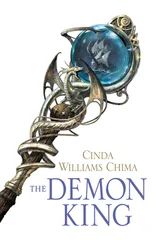‘Ah, this chap, Constable Barker, yes? Well… he’s been hit in the face, basically, very fast and very hard.’ He stood, ran his hands through his hair. ‘I think he’s come here to the front of the room, opened the door and been walloped with a… a bloody piledriver which sent him into the wall and onto the floor, at which point our assailant has borne down on him and cracked him a few more times. Once or twice with his fists, I think, then with a stick or a club or something, lots of long thin bruises across the shoulders and neck. And the line of damage here…’ He indicated a particular trough in the bone-flecked pulp of the face.
‘And the other?’
The doctor shook his head, and blinked several times. ‘Never seen that before, to be honest. He’s had his neck broken, which sounds straightforward enough, but… well, my God, you’ve seen him, yes?’ Crowley nodded. ‘I don’t know… do you have any idea how strong the human neck is, Inspector? It’s not so very difficult to break a neck but someone has turned his the wrong way round… And they’ve had to dislocate all the vertebrae completely, so that tension in the flesh doesn’t send the head back round to the front. So they didn’t just turn his head round, they pulled upwards while they were doing it. You’re dealing with someone very, very strong, and, I shouldn’t wonder, with some sort of karate or judo or something.’
Crowley pursed his lips. ‘There’s no real sign of struggle, so they were fast. Page opens the door and has his neck done in half a second, makes a little noise. Barker moves to the door of the bedroom, and…’
The doctor looked at Crowley in silence. Crowley nodded his thanks and rejoined his companions. Herrin and Bailey were still staring at the implausible figure of Constable Page.
Herrin looked up as Crowley approached. ‘Jesus fucking Christ, sir, it’s like that film…’
‘The Exorcist. I know, Constable.’
‘But like all the way round, sir…’
‘I know, Detective, now give it a rest. We’re leaving.’
The three ducked under the twists of tape which sealed the flat, and made their way down through the bowels of the building. Outside, a large patch of grass was still surrounded with the same tape that closed off the flat above. Vicious droplets of glass still littered the earth.
‘It doesn’t seem possible, sir,’ said Bailey, as they approached the car.
‘What do you mean?’
‘Well, I saw Garamond when he came in. Quite a big bloke but no Schwarzenegger. And Jesus, he didn’t look capable of…’ Bailey spoke quickly, still deeply shocked.
Crowley nodded as he swung the car round. ‘I know you’re never supposed to let yourself make judgements about who’s "the type" and who’s not, but I’ve got to admit, Garamond’s shocked me. I thought, "Fine, no problem. Argues with the dad, struggle, shoves him out the window, in shock, goes to bed." Bit odd that, I admit, but when you’re drunk and freaked out, you do odd things.’
‘But I certainly didn’t have him down for the little Houdini he turned out to be. And as for this…’
Herrin was nodding vehemently.
‘How did he do that? Door open, cell empty, no one sees him, no one hears a thing.’
‘But all this,’ continued Crowley, ‘this is a real… surprise.’ He gobbed the word out with disgust. He spoke slowly, his quiet voice halting momentarily between each word. ‘What I interviewed last night was a scared, confused, fucked-up little man. Whatever escaped from the station was some sort of master criminal, and whatever killed Page and Barker was… an animal.’
He thinned his eyes and gently thumped the steering-wheel. ‘But everything about this is weird. Why did none of the neighbours hear anything going on between him and the dad? His camping story checks out?’ Herrin nodded. ‘We can put him in Willesden at about ten, Mr Garamond hit the ground at about ten-thirty, eleven. Someone should’ve heard it. How’s it going with the rest of the family?’
‘Series of blanks,’ said Bailey. ‘Mum’s long dead, you know, and she was an orphan. His dad’s parents are dead, there’s no uncles, an aunt in America no one’s seen for years… I’m moving on to his mates. Some of them have already been calling in. We’ll go chase them up.’
Crowley grunted assent as they pulled in at the station. Colleagues slowed as he walked past, gazed at him unhappily, wanting to say something about Page and Barker. He pre-empted them by nodding sadly, then moved on. He had no desire to share his shock.
He returned to his desk, sipping the crap from the coffee machine. Crowley was losing his grasp on what was going on. It was disquieting him. The previous evening, when he had discovered that Saul had walked out of his cell, he had been filthy angry, livid — but he had made the right noises, done the right things. There’d been some major fuck-up obviously, and he would have serious words with a few people, just as the governor had had words with him. He had sent men out delving into Willesden’s darkness; Saul could not have got far. As a precaution, he had sent Barker to join Page in the boring task of watching over the crime scene, just in case Saul should be so stupid as to return home.
Which it seemed he had done. But not the Saul he had interviewed, he would not believe that. He accepted that he made mistakes, could misjudge people, but not like that, he could not believe it. Something had demented Saul, given him the strength of the unhinged, and changed him from the person Crowley had interviewed into the devastating assassin who had brought such carnage to the small flat.
Why had he not run? Crowley could not understand. He shoved his fingers into his eyes, kneaded them till they ached. Saul had returned, he pictured it, disorientated and stumbling, to the flat; to atone, perhaps, to try to remember, perhaps; and when he opened the door on the men in uniform he should have run, or fallen to the floor crying, denied all knowledge, snivelled.
Instead he had reached out towards Constable Page, taken his head in his hands and torn it around in less than a second. Crowley winced. His eyes were closed but that was no respite from the brutal image.
Saul had quietly dosed the door behind him, had turned to Constable Barker who was surely gazing at him in momentary confusion, had punched him back five feet, following the suddenly limp body, and beaten his face systematically into a broken, bloody, shattered thing.
Constable Page was a stupid stocky man, quite new to the force. He was talkative, forever telling idiot jokes. They were often racist, although his girlfriend, Crowley knew, was of mixed race. Barker was a perpetual footsoldier, had been a constable for too long, but would not get the message and change his career. Crowley had not known either of the men well.
There was an unpleasant sombreness about the station: not so much shock as a tentative uncertainty about how to react. People were unused to death.
Crowley put his head in his hands. He did not know where Saul was, he did not know what to do.
Greasy-looking clouds slid above the alley in which King Rat and Saul sat digesting. Everything seemed dirty to Saul. His clothes and face and hair were smeared with a day and a half’s muck, and now dirt was inside him. As he drew sustenance from it, it coloured what he could see, but he looked around at his newly tarnished world as if it were a cynosure. It held no horror for him.
Purity is a negative state and contrary to nature, Saul had once read. That made sense to him now. He could see the world clearly in all its natural and supernatural impurity, for the first time in his life.
He was conscious of his own smell: the old acridity of alcohol splashed on these clothes long ago, the muck from the gutter of the roof, rotting food; but something new underneath it all. A taste of animal in his sweat, something of that scent which had entered his cell with King Rat two nights ago. Maybe it was in his mind. Maybe there was nothing beyond the faint remnants of deodorant, but Saul believed he could smell the rat in him coming out.
Читать дальше
